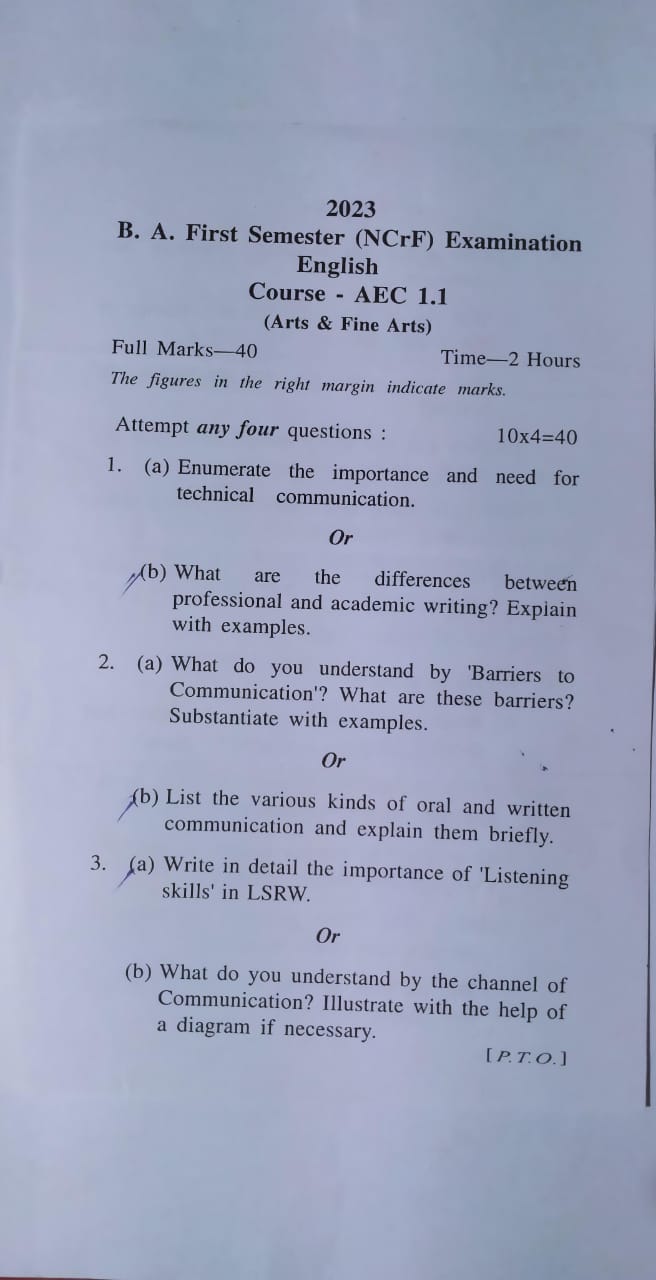Enumerate the importance and need for technical communication. What are the differences between professional and academic writing? Explain with examples. What do you understand by... Enumerate the importance and need for technical communication. What are the differences between professional and academic writing? Explain with examples. What do you understand by 'Barriers to Communication'? What are these barriers? Substantiate with examples. List the various kinds of oral and written communication and explain them briefly. Write in detail the importance of 'Listening skills' in LSRW. What do you understand by the channel of Communication? Illustrate with the help of a diagram if necessary.

Understand the Problem
The question is part of an examination paper asking students to discuss various aspects of communication, including its importance, differences in writing styles, barriers to communication, types of communication, and listening skills.
Answer
Technical communication is vital for clear information exchange. Professional writing is concise; academic writing is analytical. Barriers to communication include linguistic and cultural issues. Channels of communication are information pathways. Listening is crucial in LSRW.
1(a) Technical communication is crucial for effectively conveying complex information, improving teamwork, enhancing customer understanding, and boosting productivity. 1(b) Professional writing focuses on business contexts with a clear, concise style, while academic writing prioritizes research and analysis. Examples: Business reports vs. research papers. 2(a) Barriers to communication include linguistic, psychological, emotional, physical, and cultural obstacles. Example: Language differences leading to misunderstandings. 2(b) Types of communication: Oral (e.g., meetings, presentations) and written (e.g., emails, reports). 3(a) Listening skills are vital in LSRW as they enhance understanding, retention, and effective interaction. 3(b) Communication channels refer to how information flows within an organization, such as formal or informal pathways.
Answer for screen readers
1(a) Technical communication is crucial for effectively conveying complex information, improving teamwork, enhancing customer understanding, and boosting productivity. 1(b) Professional writing focuses on business contexts with a clear, concise style, while academic writing prioritizes research and analysis. Examples: Business reports vs. research papers. 2(a) Barriers to communication include linguistic, psychological, emotional, physical, and cultural obstacles. Example: Language differences leading to misunderstandings. 2(b) Types of communication: Oral (e.g., meetings, presentations) and written (e.g., emails, reports). 3(a) Listening skills are vital in LSRW as they enhance understanding, retention, and effective interaction. 3(b) Communication channels refer to how information flows within an organization, such as formal or informal pathways.
More Information
Effective technical communication ensures that complex ideas are understood by diverse audiences. Listening is a key part of communication skills, aiding effective comprehension and response.
Tips
Confusing professional writing with academic can lead to inappropriate style use. Always consider the audience and purpose.
Sources
- Difference between academic and professional writing - lpsonline.sas.upenn.edu
- Barriers to Effective Communication - BYJU'S - byjus.com